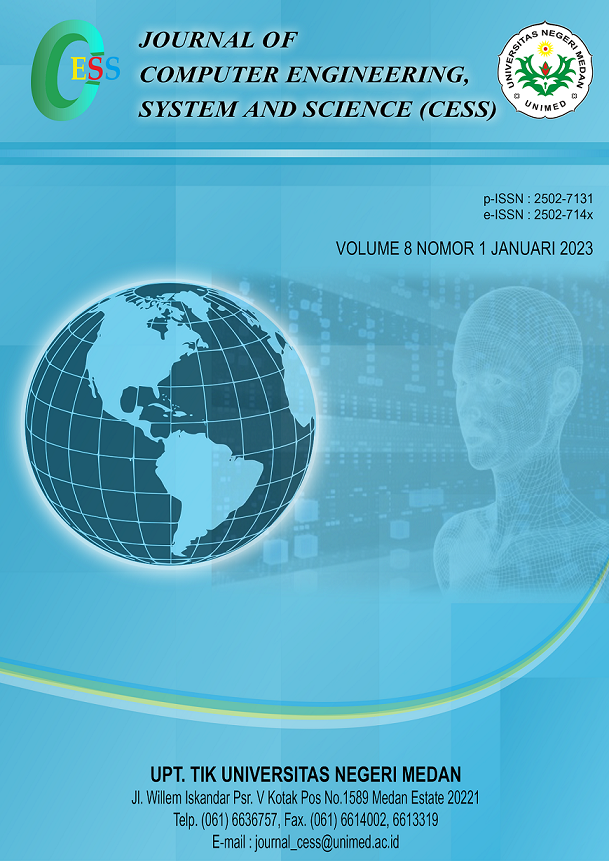Sentiment Analysis on COVID-19 Vaccine using Naive Bayes Classifier, Support Vector Machine and K-Nearest Neighbors
DOI:
https://doi.org/10.24114/cess.v8i1.40158Keywords:
Naive Bayes Classifier, Support Vector Machine, K-Nearest Neighbors, Analisis Sentimen Twitter, Vaksin COVID-19.Abstract
Procurement of the COVID-19 vaccination has led to diverse opinions among Indonesian people on Twitter. Sentiment analysis on Twitter can be carried out to find out public opinion, especially among Twitter users. The data was used in the form of tweets with the topic of the COVID-19 vaccine using the keywords covid 19 vaccine, covid vaccine, AstraZeneca, Sinovac, Moderna, Pfizer, Novavax and Sinopharm. analysis of the performance of the Naive Bayes Classifier, Support Vector Machine and K-Nearest Neighbors algorithms to determine the results of the accuracy level between the algorithms. The highest classification test is using the Support Vector Machine with an accuracy rate of 0.701. The results of the comparison of algorithms tested using tweet data on the topic of the COVID-19 vaccine found that the Support Vector Machine was better than the Naive Bayes Classifier and K-Nearest Neighbors. From the classification test carried out using COVID-19 vaccine tweet data with 2500 data. The amount of data after going through the data processing process is 1052 data. Neutral sentiment results in as many as 645 positive sentiments as many as 250 and negative sentiments as many as 157.Downloads
References
Kementerian Kesehatan RI, œUpdate Perkembangan Vaksinasi COVID-19 Di Indonesia, Per Tanggal 23 Mei 2021 Pukul 18.00 WIB, 2021. [Online]. Available: https://www.facebook.com/story.php?story_fbid=4527156370647761&id. [Diakses 23 Mei 2021].
K. Fithriasari, R. W. Mayasari, N. Iriawan dan W. S. Winahju, œSurabaya Government Performance Evaluation Using Tweet Analysis, MATEMATIKA: Malaysian Journal of Industrial and Applied Mathematics, pp. 31-42, 2022.
F. S. Pamungkas dan I. Kharisudin, œAnalisis Sentimen dengan SVM, NAIVE BAYES dan KNN untuk Studi Tanggapan Masyarakat Indonesia Terhadap Pandemi Covid-19 pada Media Sosial Twitter, In PRISMA, Prosiding Seminar Nasional Matematika, pp. 628-634), 2021.
B. Laurensz dan E. Sediyono, œAnalisis Sentimen Masyarakat terhadap Tindakan Vaksinasi dalam Upaya Mengatasi Pandemi Covid-19, urnal Nasional Teknik Elektro dan Teknologi Informasi, pp. 118-123, 2021.
M. Syarifuddinn, œAnalisis Sentimen Opini Publik Mengenai Covid-19 Pada Twitter Menggunakan Metode Naïve Bayes Dan Knn, Inti Nusa Mandiri, pp. 23-28, 2020.
R. Feldman dan J. Sanger, The text mining handbook: advanced approaches in analyzing unstructured data, The text mining handbook: advanced approaches in analyzing unstructured data, 2007.
M. N. Rizaldi, A. Adiwijaya dan S. A. Faraby, œKlasifikasi Argument Pada Teks dengan Menggunakan Metode Multinomial Logistic Regression Terhadap Kasus Pemindahan Ibu Kota Indonesia di Twitter, Jurnal Media Informatika Budidarma 4, vol. 4(4), pp. 904-913, 2020.
S. Khairunnisa, . A. Adiwijaya dan S. A. Faraby, œPengaruh Text Preprocessing terhadap Analisis Sentimen Komentar Masyarakat pada Media Sosial Twitter (Studi Kasus Pandemi COVID-19, Jurnal Media Informatika Budidarma, pp. 406-414, 2021.
M. I. Aditama, R. I. Pratama, K. H. U. Wiwaha dan N. A. Rakhmawati, œAnalisis Klasifikasi Sentimen Pengguna Media Sosial Twitter Terhadap Pengadaan Vaksin COVID-19, Journal Information Engineering and Educational Technology) ISSN 2549, 2022.
J. Han, J. Pei dan M. Kamber, Data Mining: Concepts And Techniques, Elsevier, 2012.
O. Arifin dan T. B. Sasongko, œAnalisa Perbandingan Tingkat Performansi Metode Support Vector Machine Dan Naïve Bayes Classifier Untuk Klasifikasi Jalur Minat SMA, SEMNASTEKNOMEDIA ONLINE, vol. 6(1), pp. 1-2, 2018.
Downloads
Published
How to Cite
Issue
Section
License
Copyright (c) 2023 CESS (Journal of Computer Engineering, System and Science)

This work is licensed under a Creative Commons Attribution 4.0 International License.















